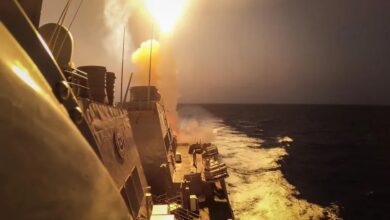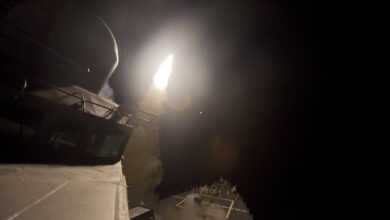EU Launches Red Sea Mission as US Ship Attacked Twice
The European Union launched a naval mission on Monday to protect Red Sea shipping from Yemen’s Houthi rebels as a US-owned cargo vessel repeatedly came under fire in the region.
The Iran-backed Houthis, who control much of war-torn Yemen, have been harassing the vital shipping lane since November in a campaign they say is in solidarity with Palestinians in Gaza during the Israel-Hamas war.
The EU aims to have the mission — called Aspides, Greek for “shield” — up and running in a “few weeks” with at least four vessels, an official said on Friday, ahead of Monday’s official launch.
“Europe will ensure freedom of navigation in the Red Sea, working alongside our international partners,” European Commission President Ursula von der Leyen wrote on X, formerly Twitter.
I welcome today’s decision to launch the EU Naval Force Operation Aspides.
Europe will ensure freedom of navigation in the Red Sea, working alongside our international partners.
Beyond crisis response, it's a step towards a stronger European presence at sea to protect our…
— Ursula von der Leyen (@vonderleyen) February 19, 2024
The United States is already spearheading its own naval coalition in the area and has conducted retaliatory strikes on the Houthis in Yemen along with Britain.
The dozens of Houthi attacks have roiled shipping in the Red Sea, forcing some companies to take alternative routes including a two-week detour around the tip of southern Africa.
In the latest incident, a Greek-flagged, US-owned cargo ship was attacked twice in two hours in the Gulf of Aden, which adjoins the Red Sea, maritime security firm Ambrey said.
The Greek-flagged bulk carrier reported a “missile attack” before another projectile hit the water just meters from the ship, Ambrey said.
The ship’s master reported “evidence of shrapnel and damage to paintwork” in the second incident, the British Navy’s UK Maritime Trade Operations said.
Earlier, the Houthis claimed an attack on a British ship in the Gulf of Aden that was earlier reported by Ambrey.
The ship is “now at risk of potential sinking in the Gulf of Aden,” the Houthis’ military spokesman Yahya Saree said in a statement. The claim could not be independently verified.
‘Impact on the Entire World’
As the attacks continued, Qatar’s energy minister called for a ceasefire in Gaza to end the insecurity in the Red Sea, which has disrupted hydrocarbon deliveries along with other trade.
Saad al-Kaabi, who is also the chief executive of state-owned QatarEnergy, said the “root of the problem” in the Red Sea, where Iran-backed Houthi rebels have targeted commercial vessels, “is the Israeli invasion of Gaza.”
“Hopefully there is a ceasefire soon that will stop that so that the economic impact on the entire world stops,” he said at a ground-breaking ceremony for a new petrochemicals plant on Qatar’s northeast coast.
Italian top diplomat Antonio Tajani confirmed the EU mission’s launch during a meeting of foreign ministers in Brussels, calling it “an important step towards common European defense.”
The overall commander of the EU mission will be Greek, while the lead officer in operational control at sea will be Italian.
So far, France, Germany, Italy, and Belgium have said they plan to contribute ships.
The EU says the mission’s mandate — set initially for one year — is limited to protecting civilian shipping in the Red Sea and that no attacks will be carried out “on Yemeni soil.”
An EU official said there would be “continuous military to military contact” to coordinate actions with the US and other forces in the region.
The EU’s 27 countries agreed to the Red Sea mission in a matter of weeks as concerns mount that the Houthi attacks could damage their economies and push up inflation.












